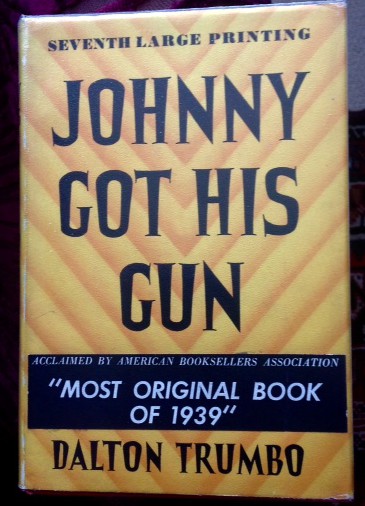Inspiring Older Readers
 posted on 24 Feb 2016
posted on 24 Feb 2016
Johnny Got His Gun by Dalton Trumbo
In an age when superlatives are commonly lavished on the ordinary and mundane it somehow feels niggardly to call this book extraordinary – but that’s what it is in the genuine use of that word. It may well be that Trumbo will become a better known figure than he has been until now because of the recent film release that deals with his black-listing within the Hollywood Communist-obsessed movie industry of the 1940s but his reputation as a daring novelist pre-dates this episode by almost a decade.
Released in 1938 Johnny Got His Gun is an emotional and hard-hitting anti-war novel – something that the American reader might have seen as having a particular relevance as Europe stood on the brink of war and the Spanish experience had demonstrated what modern, high technology war would be like.
Trumbo not only takes risks with the subject matter but also with the form of the novel – setting it almost entirely as an internal monologue. The man who tells the tale is Joe Bonham and we enter his narrative in his hospital bed as he begins to gain consciousness and become aware that he has lost his arms and legs as well as most of his face. He is also deaf - and so is entirely trapped within his own damaged body. As he drifts in and out of consciousness we join Joe as he remembers key incidents from his past – his years growing up in small town USA, his tentative attempts to lose his virginity and his relationship with his girlfriend Kareen who sees him off to war.
These memories start off as nostalgic but become increasingly embittered as he contemplates his fate and the way war has cut off his youth and robbed him of his humanity. As time passes he tries to master basic skills – using the sensitivity of his skin to sense movement and atmospheres, trying to develop a way of counting the passing of time and ultimately trying to communicate.
As he contemplates his future he begins to develop a plan of action – he will use Morse code to communicate with the outside world. His efforts are frustrated at first but he eventually finds a sympathetic nurse who is able to understand that he is trying to communicate. Ultimately he is able to tell the world outside what he wants: either to die or to be put in a glass box and taken around the country as a salutary warning against the horrors of war and the way it makes victims of ordinary people who have no desire to die for their country.
Both requests are rejected by the army hierarchy and the book ends with Joe forever trapped in the prison of a body that cannot respond to the outside world and will forever be hidden from the wider public so that the lessons of his story are never learned.
Not surprisingly given Trumbo’s career as a screen writer, a movie was made of the book – which at the time was a surprise hit with a wide readership and which even gained ‘Book of the Month’ status. The film didn’t do particularly well at the box office at the time but it has since gone on to become something of a cult film on the alternative circuit.
Trumbo’s radical politics are evident throughout without ever becoming remorselessly didactic and it is the sheer humanity of Joe’s situation that lingers in the mind. The vitality of the young man turned into thinking meat sits starkly alongside the jingoism associated with the First World War. There’s more than one kind of death and it’s rarely clean and never heroic but for those who don’t die when they should the living death is even more of a purgatorial punishment – one society simply doesn’t want to acknowledge.
A fine book, an extraordinary book, and one which should be on every school syllabus alongside the work of Wilfred Owen.
Terry Potter
February 2016